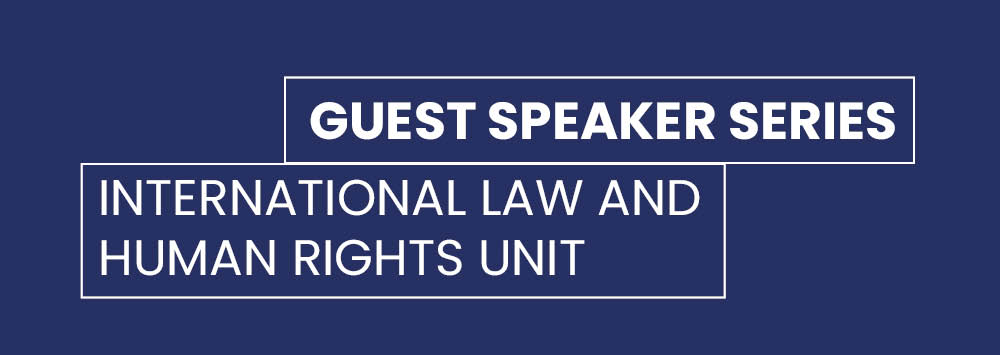14 March 2023
Collective Self-Defence

Professor James Green, University of Bristol, gave the lecture titled 'Collective Self-Defence'.
9 March 2023
The Rights of Nature and Indigenous Peoples

Professor Malgosia Fitzmaurice, Queen Mary University of London, visited the School to give a presentation which endeavoured to explore and analyse a complex and a multifaceted question of the rights of nature and the role of Indigenous peoples in the creating, shaping, and defining of such rights.
6 December 2022
Litigating for climate justice? Climate change before the ECHR

In the lecture, Dr Corina Heri explored the adequacy of existing human rights for responding to climate change, the strategic potential of rights-based arguments, and the opportunity to challenge enduring myths around litigation. She does so by looking specifically at the European Court of Human Rights, where anticipation around the fate of pending climate cases is growing.
Bio
Dr Corina Heri, University of Zurich, co-leads the “Climate Rights and Remedies” research project and researches international human rights law in theory and practice. Her work has appeared in the Human Rights Law Review, the European Journal of International law, and the German Law Journal, among others. Her monograph, “Responsive Human Rights: Vulnerability, Ill-Treatment and the ECtHR”, was published by Hart Publishing in 2021.
22 November 2022
Reasons to Rethink Human Rights Penality

In this lecture Professor Natasa Mavronicola made the case for rethinking human rights penality from the perspective of a constructively critical supporter of human rights. She identified some of the key ways in which human rights penality is bad for human rights, and invite those committed to human rights to rethink in more protective terms the obligations to which human rights penality is attached.
Bio
Prof. Natasa Mavronicola is Professor of Human Rights Law at the University of Birmingham. Natasa researches and teaches in the areas of human rights, public law, and legal theory, as well as on the interplay between counter-terrorism and human rights and intersections between human rights and criminal justice.
26 September 2022
Annual Lecture of the International Law and Human Rights Unit
Professors Laurence Helfer and Molly Land present on 'The Facebook Oversight Board's Human Rights Future' having published multiple papers on the subject.
Bio
Laurence R. Helfer is Harry R. Chadwick, Sr. Professor of Law and co-director of the Center for International and Comparative Law at Duke University. He also serves as a Permanent Visiting Professor at the iCourts: Center of Excellence for International Courts at the University of Copenhagen, which awarded him an honorary doctorate in 2014. Helfer was nominated by the United States and elected as a member of the UN Human Rights Committee for 2023 to 2026. He recently completed a four-year term as co-Editor-in-Chief of the American Journal of International Law.
9 June 2022
“Get Back!”: Inside the Biden Administration’s Efforts to Restore

Joe Biden entered the White House determined not just to reverse the excesses of the Trump Administration, but also more ambitiously to restore the postwar liberal order of international law and institutions to “get back to where we once belonged.” After a year and a half, how well has he succeeded?
In this lecture, Professor Harold Hongju Koh, Sterling Professor of International Law and former Dean at Yale Law School, currently Counsel to Ukraine against Russia at the World Court, and a legal advisor to four Presidents, including President Biden in his first year, offers this insider’s account and assessment.
Bio
Professor Harold Hongju Koh is Sterling Professor of International Law and former Dean (2004-09) at Yale Law School. He is currently a George Eastman Visiting Professor at Balliol College, Oxford University. Professor Koh has served under four US presidents, as Senior Advisor (2021-present) and Legal Adviser to the US Secretary of State (2009-2013), Assistant Secretary of State for Democracy, Human Rights and Labor (1998-2001), and Attorney-Adviser at the US Department of Justice (1983-1985).
8 December 2020
Military Assistance on Request and General Reasons Against Force: Consent as a Defence to the Prohibition of Force
Dr Federica Paddeu, University of Cambridge, is the Derek Bowett Fellow in Law at Queens’ College, Cambridge, and a Fellow of the Lauterpacht Centre for International Law. She holds a law degree from Universidad Catolica Andres Bello in Caracas, Venezuela, and an LLM and PhD in international law from Cambridge. She has written on diverse aspects of the use of force, investment law and State responsibility. Her monograph, Justification and Excuse in International Law was published by CUP in 2018 and a co-edited book on Exceptions in International Law was published by OUP earlier this year.
10 November 2020
Reflections on the ‘Trump Doctrine’: The US Election, US Foreign Policy, and the Jus ad Bellum
This webinar uses the opportunity of the US general election on 3rd November to reflect critically on the relationship between the Trump Presidency (in retrospect or at the half-way point), international law generally, and the jus ad bellum in particular. Speakers addressed the topic from a variety of perspectives.
Chaired by Dr Ben Murphy, Lecturer in Law and Deputy Director of the International Law and Human Rights Research Unit, University of Liverpool. Speakers include:
- Danielle Rae Reeder, Doctoral Researcher, University of Liverpool. The Trump Presidency in Reflection: Jus Ad Bellum, Peace, Security and the Rules-Based Order
- Katie Johnston, DPhil (PhD), University of Oxford. The Trump Administration’s Justifications for the Use of Force
- Dr Luca Ferro, postdoctoral researcher at the Ghent Rolin-Jaequemyns International Law Institute (GRILI) of Ghent University (Belgium). Trump v. Soleimani: The Role of International Lawyers in Constraining Bellicose Governments
Watch the recording
21 October 2020
The Role of the European Court of Human Rights and the Council of Europe in Armed Conflicts
Hundreds of applications land at the European Court of Human Rights during and in the aftermath of military confrontations between the member states and as a result of military operations of the member states overseas. This webinar will consider if the European Court of Human Rights and the Council of Europe can do anything to prevent human rights violations before, during and after military interventions.
Chaired by Dr Vassilis Tzevelekos (University of Liverpool), panellists include:
- Dr Aurel Sari (University of Exeter) Overreach: Should the ECHR apply to the Battlefield?
- Prof Kanstantsin Dzehtsiarou (University of Liverpool) Why Are the Court’s Interim Measures During Armed Conflicts Controversial?
- Dr Isabella Risini (Ruhr-University Bochum) The strengths and limitations of inter-State proceedings under the ECHR in cases related to military confrontation.
- Dr Jane Rooney (University of Durham) Hanan v Germany: A Re-Evaluation of Extraterritorial Airstrikes at the European Court of Human Rights?
- Andrew Forde (NUI Galway) In Pursuit of Effectiveness: The Role of the ECHR System in Contested Territories
Watch the recording
28 February 2020

Authoritarian Statism, the United States, and War
Dr Catherine Connolly, Dublin City University
Using Nicos Poulantzas’ theory of Authoritarian Statism, this paper examines the United States’ - in particular, the Trump administration’s - approach to power in the domestic arena, and its impact on public international law and war.
Publicising Consent: Intervention by Invitation in the Age of Liquid Warfare
Dr Max Brookman-Byrne, Lincoln Law School
The paper is an investigation of the extent to which the secrecy of consent to the covert use of force impacts upon its validity. To put it differently, it is an investigation as to whether there is a ‘publicity requirement’ in consenting to intervention. There will be examination of various examples of state practice to demonstrate that there is no such requirement, emphasising the limited potential for jus ad bellum to restrict states having recourse to military force.
18 February 2020
Fear and Hope: The Revolution of Individual Liability in International Law between Justice and Politics

In this lecture Judge Rosario Salvatore Aitala explores the idea that individuals, not only States, may be held liable for mass atrocities amounts to a subversive theory within traditional international law. Through this revolution, the legacy of immense suffering of the Second World War has eventually generated hope for humanity. However, the achievements of international criminal justice have not always met the expectations, due to structural factors, organisational inefficiencies as well as the complicated interactions between justice and politics.
One of the next challenges ahead arguably lies in achieving universal punishment for international terrorism, a crime which throughout the centuries has relied on instrumentally exploiting human frailty with a view to achieving and retaining power.
30 January 2020
Privacy International and Judicial Authority: are courts guardians of the law, or of the rule of law?

Professor Alison Young, University of Cambridge gives a lecture on 'R (Privacy International) v Investigatory Powers Tribunal ([2019] UKSC 22)', the Supreme Court ‘reinterpreted’ an ouster clause. The clause in question stated that decisions of the Investigatory Powers Tribunal, including decisions as to whether it had jurisdiction, could not be questioned by the courts.
13 November 2019
Coming Of Age: The Human Rights Act At 21

Professor Conor Gearty, London School of Economics, gives a lectures on The Human Rights Act which received Royal Assent on 9 November 1998. In the week of its 21st birthday, how has it fared? Well it is still alive, having faced a difficult childhood and a near fatal adolescence. What trends can we detect in how the legislation is being interpreted by the courts? And what difference, if any, is it making to ‘real life’?
Watch the recordings
16 October 2019
Parliamentary Sovereignty and The Locus of Constituent Power in the United Kingdom

Dr Alan Greene, Birmingham Law School, presents on his paper which argues that parliamentary sovereignty’s assimilation of constituent power — the ultimate power in a legal order to create and posit a constitution — has stultified the development of British constitutional law. The result is a deeply ideological, as distinct from oft-heralded pragmatic, constitutional structure that is incapable of confronting the systemic challenges the UK currently faces.
Watch a recording
1 May 2019
A Clear and Present Danger? The SDGs and Human Rights

Much has been made of the bringing together of the development and the human rights agendas through the integration of human rights into the 2030 Agenda for Sustainable Development. There is, however, growing evidence that the SDGs and associated implementation processes may constitute a serious danger to human rights in terms of law, politics and practice. Focusing in particular on children’s rights, Aoife Nolan explored whether the SDGs will ultimately serve as a vehicle for the advancement or the undermining of human rights.
Professor Aoife Nolan, University of Nottingham, gives the lecture.
Watch the recordings
13 March 2019
Compensating human rights violations: Damages before the European Court of Human Rights

In her talk, Dr Veronika Fikfak presented the patterns revealed in the ECtHR case law. Building on her empirical quantitative and qualitative study of the last ten years of caselaw relating to just satisfaction, she talked about the legal principles which can be discerned from the practice of the Court and critically assessed the Court’s role in awarding compensation for human rights violations.
Watch a recording
Back to: Liverpool Law School
